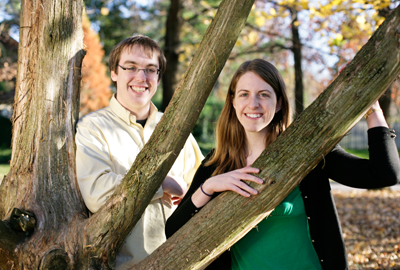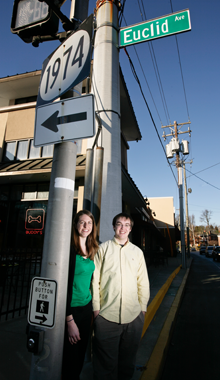Nick and Beth Kirby
Ph.D. Students
by Amber Scott
photos by Richie Wireman
During one typical afternoon in an average American high school, Nicholas Kirby, a junior at the time, found himself wandering into the "young, cool" math teacher's classroom. Curiosity about the different sizes of infinity had taken hold of him and he decided to give up his lunch break to get some answers. His teacher patiently explained this complicated concept, crystallizing an appreciation for abstract thought that would eventually become Nick's whole life.
"It was just too cool," said Nick. "I was hooked. I became a math addict."
Setting out from his hometown of Nashville, Tenn., Nick went to Carnegie Mellon in Pittsburgh to complete his bachelor’s degree in math. While there, he did research in the field of materials under his advisor and received his first introduction to the University of Kentucky, Michel Jabbour and Chi-Sing Man – an introduction that ultimately brought him here to pursue a Ph.D. – and fall in love with his wife.

Elizabeth Hayden was finishing up with her math degree at Coe College in Cedar Rapids, Iowa, when she started visiting schools to determine where she'd be working on her doctorate. In a bit of a math department tradition, Nick took her to lunch to answer questions from a student's point of view and gave her a tour of campus. The initial attraction was tempered until Beth returned to UK as a graduate student as recipient of the Daniel R. Reedy Quality Achievement Fellowship. The two began dating and eventually married in 2007.
Having two doctoral candidates in a marriage provides a unique set of challenges, but in the case of Beth and Nick, both mathematicians by training, being married has allowed them to support each other in ways that a less numerically gifted person may not be able to.
"We each have someone to empathize with," said Nick, who recently was awarded UK’s Max Steckler Fellowship. "We don't work in the same area, which is good, but we know enough about what the other person is doing to lend support and offer help."
Nick's focus is in applied mathematics and analysis, specifically in modeling and analyzing the models of epitaxial crystal growth, which are formulated as free boundary problems, by solving partial differential equations.
“The epitaxial crystal growth models that I consider model the material at a length scale such that you can't see individual atoms,” said Nick. “Instead, the growth of the crystal is modeled by the motion of steps, which look like curves when seen from above. The model consists of equations that tell you how these steps should move.”
Silicon, for example, is an important crystal that is grown via epitaxy. It's generally used in microchips and semiconductors. Through analyzing and modeling this crystal, Nick will help others grow crystals in a lab more efficiently, with fewer defects or with defects that are found to be useful.
“The work I do requires knowledge of chemistry and physics, understanding bonds and attraction, but for me, it all comes back to the mathematics," he said.
On the other side of the equation, Beth is studying algebraic topology and investigating topological spaces, which are more abstract than the 3-D Euclidian space we live in. She uses tools from algebra to compare these spaces and try to determine whether two spaces are the same. She came into this area of mathematics as a direct result of her advisor's influence.

Nick and Beth in a 2-D photo of a 3-D Euclidian street corner
As Beth was preparing for her master's talk two years ago, she asked Serge Ochanine for guidance. She'd enjoyed his classes and listening to lectures he'd given on his topological research, and ultimately directed her master's talk in the same direction.
"It's really interesting working with someone who knows so much about what seems like everything," said Beth. "You can go and ask pretty much any question and even if he doesn't know the entire answer, he knows what direction I should be headed in or where I can look it up."
Beyond the enlightening experience with their advisors, Beth and Nick have also enjoyed being a part of the math department in general. Existing in an environment built by towers of books and journals that are chronically covered in a layer of chalk dust and exploring a discipline that requires you to penetrate the depths of abstract thought can be isolating, but their experience has been far from lonely.
“We bounce ideas off each other in our marriage, but there is a lot of exchange of ideas in the department also,” said Beth. “Being able to talk about it helps you work through things, helps you realize that one step you’ve been missing.”
“I’ll tell anybody my problems,” Nick said with a laugh.
Nick is on target to complete his doctorate in 2011, and Beth will finish hers shortly thereafter. From there, both hope to secure teaching positions that will allow them to share their love of math with others all while strengthening the bond between them as a couple.
